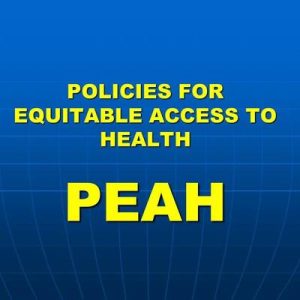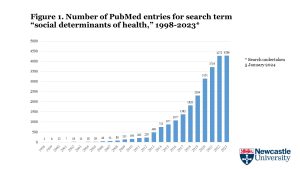IN A NUTSHELL
Editor's note
 Since the COVID-19 pandemic took everyone off guard, it is imperative that everyone be prepared for global health emergencies. Notwithstanding, before to the advent of COVID-19, millions of individuals in developing nations were silently afflicted by neglected tropical diseases (NTDs). Resilient people are severely impacted by these illnesses, which are frequently ignored by more well-known health issues. The lessons that neglected tropical diseases can impart to us about pandemic preparedness and future outbreaks will be discussed in this blog article. We can enhance our ability to respond to future health emergencies and guarantee the health and well-being of people everywhere by being aware of the difficulties associated with managing NTDs and the tactics used to deal with them
Since the COVID-19 pandemic took everyone off guard, it is imperative that everyone be prepared for global health emergencies. Notwithstanding, before to the advent of COVID-19, millions of individuals in developing nations were silently afflicted by neglected tropical diseases (NTDs). Resilient people are severely impacted by these illnesses, which are frequently ignored by more well-known health issues. The lessons that neglected tropical diseases can impart to us about pandemic preparedness and future outbreaks will be discussed in this blog article. We can enhance our ability to respond to future health emergencies and guarantee the health and well-being of people everywhere by being aware of the difficulties associated with managing NTDs and the tactics used to deal with them

By Kirubel Workiye Gebretsadik
Medical Doctor, Ras Desta Damtew Memorial Hospital
Addis Ababa, Ethiopia
Neglected Tropical Diseases: Lessons for Future Pandemics and Global Health Preparedness
The World Health Organization (WHO) continues to work towards the ultimate goal of a world free of the burden of neglected tropical diseases (NTDs). These goals encompass a vision of a world population for whom equality of opportunity and of health are fundamental. This work is described in the NTD road map 2021–2030(1,2).
Understanding neglected tropical diseases (NTDs)
Neglected tropical diseases (NTDs) are a group of infectious diseases that predominantly affect the world’s poorest populations in tropical and subtropical regions. Despite their devastating impact on individuals and communities, NTDs often do not receive the same attention and resources as other global health issues. However, the lessons learned from addressing NTDs can provide valuable insights for future pandemics and global health preparedness. One key aspect of understanding NTDs is recognizing their diverse nature(3). NTDs encompass a wide range of diseases, including dengue fever, leprosy, lymphatic filariasis, and schistosomiasis, among others. These diseases are often intertwined with poverty and lack of access to clean water, sanitation, and healthcare. Understanding the complex socio-economic factors that contribute to the spread and persistence of NTDs is crucial in developing effective strategies to combat them. Another important aspect of NTDs is their impact on marginalized communities. These diseases disproportionately affect vulnerable populations, such as rural communities, and those living in remote areas with limited healthcare infrastructure(4). The burden of NTDs continues to be unequally borne by a small number of countries: 16 countries bear 80% of this burden. Slower than expected progress in high burden countries, uneven progress across certain of the 20 diseases and disease groups, persistent underlying risk factors (poverty, climate change) and rapid population growth are all threats to achieving the 2030 targets within the defined timescales(5). By addressing NTDs, we can learn valuable lessons about the importance of equity and inclusivity in global health interventions. Moreover, the control and elimination of NTDs require a multi-sectoral approach. Collaboration between governments, non-governmental organizations, academia, and industry is essential in developing innovative solutions, implementing preventive measures, and delivering effective treatments. This multidisciplinary approach can serve as a blueprint for future pandemics, emphasizing the need for cooperation and coordination across various sectors and stakeholders. Furthermore, NTDs highlight the significance of community engagement and empowerment. Local communities play a critical role in disease prevention, early detection, and treatment adherence. Empowering communities with knowledge, resources, and tools can enhance their capacity to tackle NTDs and can be applied to promote community resilience during pandemics. In conclusion, understanding neglected tropical diseases provides valuable insights and lessons for future pandemics and global health preparedness. By recognizing the diverse nature of NTDs, addressing their impact on marginalized communities, adopting a multi-sectoral approach, and engaging with local communities, we can strengthen our capacity to mitigate the impact of diseases and ensure a more equitable and resilient global health system.
Lessons for global health preparedness
The COVID-19 pandemic has highlighted the need of being prepared for global health emergencies and the necessity of developing efficient methods to fight infectious illnesses. Neglected tropical diseases (NTDs) provide important insights that can be used to address pandemics and other global health problems in the future. The importance of early discovery and quick action is one of the most important lessons to be learned from NTDs. Numerous NTDs, like the Zika virus and dengue fever, have demonstrated the disastrous effects of postponing treatment.
Therefore, early detection methods, timely diagnosis, and quick control measure implementation should be given top priority in terms of global health preparedness. The value of community involvement and empowerment is a further lesson. Disadvantaged and marginalised groups are primarily impacted by NTDs. Involving communities in decision-making processes, ensuring access to healthcare resources, and addressing social determinants of health are critical to effectively combating chronic diseases(6). This strategy fosters resilience and trust in communities while also increasing the efficacy of interventions. Moreover, it is impossible to ignore how NTDs are interrelated and how they affect larger health systems. The strain on healthcare systems is increased when NTDs coexist with other health issues. To enhance global health preparedness, a holistic and integrated approach is essential. This entails strengthening healthcare infrastructure, improving laboratory capacity, and promoting cross-sector collaborations. Lastly, NTDs highlight the importance of research and innovation in global health preparedness. Through research, we can better understand the epidemiology, transmission dynamics, and potential interventions for both NTDs and emerging infectious diseases(7). This knowledge can inform the development of diagnostic tools, therapeutics, and vaccines, equipping us with the necessary tools to respond effectively to future pandemics. In conclusion, neglected tropical diseases serve as a valuable source of lessons for global health preparedness, and there are important lessons to be learned about global health preparedness from neglected tropical diseases. Our ability to respond to future pandemics will be improved, and a more prepared and resilient global health landscape will result from placing a higher priority on early detection, community participation, improving the healthcare system, and research and innovation.
Strategies to combat neglected tropical diseases
When it comes to combating neglected tropical diseases (NTDs), there are several key strategies that have proven to be effective. These strategies not only help in addressing the burden of NTDs but also serve as valuable lessons for future pandemics and global health preparedness(2,8,9):
- Mass Drug Administration (MDA): MDA involves the distribution of preventive chemotherapy to entire at-risk populations, regardless of infection status. This approach has been successful in controlling diseases like lymphatic filariasis, onchocerciasis, and schistosomiasis.
- Integrated Vector Management (IVM): Many NTDs are transmitted through vectors like mosquitoes, flies, and snails. IVM focuses on controlling these vectors through a combination of approaches, including insecticide-treated bed nets, indoor residual spraying, larval source management, and environmental modifications. By targeting the vectors, IVM helps to interrupt disease transmission and reduce the burden of NTDs.
- Improved Access to Safe Water, Sanitation, and Hygiene (WASH): Addressing NTDs requires a multi-sectoral approach that includes improving access to safe water, sanitation, and hygiene. Good WASH practices, play a crucial role in preventing NTDs like trachoma and soil-transmitted helminthiasis.
- Strengthening Health Systems: To effectively combat NTDs, it is crucial to strengthen health systems in endemic areas. This includes training healthcare workers, improving diagnostic capabilities, enhancing surveillance systems, and ensuring the availability of essential medicines and supplies. A robust health system ensures early detection, prompt treatment, and effective management of NTDs
- Cross-Sector Collaboration and Partnerships: Combating NTDs requires collaboration among multiple sectors, including health, education, water, sanitation, and agriculture.
Leveraging resources, sharing expertise, and implementing comprehensive solutions necessitates partnerships with academic institutions, communities, governments, and non-governmental organizations. These partnerships encourage creativity, resource mobilization, and long-term approaches to NTDs. By putting these ideas into practice, we can not only make great strides towards managing and eradicating neglected tropical diseases, but we can also learn important lessons for pandemic preparedness and future outbreaks(4). A better and more resilient world can be ensured by utilizing the information and experiences obtained from battling NTDs to develop tactics that work, fortify health systems, and improve our capacity to respond to health risks in the future.
Conclusion
In conclusion, NTDs provide us with important lessons for future pandemics and global health preparedness. These diseases, often affecting the most vulnerable populations in low-resource settings, have long been overlooked and underestimated. However, the current global health crisis has shed light on the interconnectedness of our world and the urgent need for proactive measures to prevent and control diseases. One key lesson we can learn from NTDs is the importance of early detection and rapid response. By implementing robust surveillance systems and investing in diagnostic tools, we can identify outbreaks swiftly and take immediate action to contain the spread. Additionally, the need for effective communication and collaboration among different stakeholders cannot be overstated. Global health agencies, governments, researchers, and communities must work together to develop and implement comprehensive strategies that address the social, economic, and environmental factors contributing to these diseases. Furthermore, NTDs highlight the significance of equity in healthcare. The disproportionate burden faced by marginalized communities underscores the urgency for inclusive and accessible healthcare systems. As we face the challenges of future pandemics, it is crucial to prioritize the needs of disadvantaged populations and ensure equitable access to prevention, treatment, and care. Lastly, the lessons learned from neglected tropical diseases emphasize the importance of investing in research and innovation. By supporting scientific advancements and fostering collaborations, we can develop effective interventions and technologies to combat emerging infectious diseases. This includes the development of new diagnostics, drugs, and vaccines, as well as the exploration of non-traditional approaches such as vector control and community engagement. In summary, NTDs serve as a reminder of the critical need for global health preparedness. By applying the lessons learned from these diseases, we can build resilient health systems, enhance surveillance and response capabilities, promote health equity, and foster innovation. On 31 May 2021, the World Health Assembly (WHA) recognized 30 January as World Neglected Tropical Disease (NTD) Day through decision WHA74(18). Through a comprehensive and collaborative approach, we can better prepare ourselves for future pandemics and ultimately improve the overall well-being of our global community.
References
- Neglected tropical diseases [Internet]. [cited 2023 Dec 31]. Available from: https://www.who.int/news-room/questions-and-answers/item/neglected-tropical-diseases
- Neglected tropical diseases — GLOBAL [Internet]. [cited 2023 Dec 31]. Available from: https://www.who.int/health-topics/neglected-tropical-diseases
- Engels D, Zhou XN. Neglected tropical diseases: an effective global response to local poverty-related disease priorities. Infectious Diseases of Poverty. 2020 Jan 28;9(1):10.
- NTDs in Focus [Internet]. The END Fund. 2017 [cited 2023 Dec 31]. Available from: https://end.org/ntds-in-focus/
- Molyneux D. Neglected tropical diseases. Community Eye Health. 2013;26(82):21–4.
- Neglected Tropical Diseases – an overview | ScienceDirect Topics [Internet]. [cited 2023 Dec 31]. Available from: https://www.sciencedirect.com/topics/medicine-and-dentistry/neglected-tropical-diseases
- Neglected Tropical Diseases (NTDs) | DNDi [Internet]. [cited 2023 Dec 31]. Available from: https://dndi.org/diseases/neglected-tropical-diseases/
- Molyneux DH, Asamoa-Bah A, Fenwick A, Savioli L, Hotez P. The history of the neglected tropical disease movement. Transactions of The Royal Society of Tropical Medicine and Hygiene. 2021 Jan 28;115(2):169–75.
- CDC – Neglected Tropical Diseases – Global NTD Programs [Internet]. 2020 [cited 2023 Dec 31]. Available from: https://www.cdc.gov/globalhealth/ntd/global_program.html
—-
By the same Author on PEAH
Forgone Health Care Among Patients With Cardiovascular Disease
UNMET HEALTHCARE
Malaria Eradication and Prevention through Innovation
ONE HEALTH ONE WORLD
Social Innovation in Healthcare







